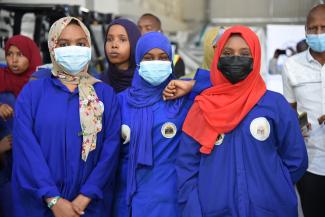Gender is a cross-cutting issue in all USAID activities. Inequality between men and women in Djibouti stems from deep-rooted social and cultural norms, and limits women’s access to economic opportunities and resources. A Djiboutian woman’s ability to take advantage of opportunities and resources is further curtailed due to low education levels. Consequently, women’s participation and influence in decision-making at the national level is minimal.
Djibouti’s Early Grade Reading Activity (DEGRA) activity focuses on gender gaps among students in urban and rural primary schools. The project developed educational materials that consider both boys’ and girls’ preferences for reading, produced educational materials free of gender stereotypes, trained teachers and designed textbooks that increase awareness of the importance of gender equity.
USAID’s partnerships with the Citizen Engagement for Advocacy and Accountability Activity and female-led civil society organizations (CSO) encourage gender equality in targeted development sectors. Through the provision of sub-grants to the CSOs, this activity empowers women and youth through tailored, gender-sensitive activities such as discussions on gender-based violence and female genital mutilation, in collaboration with the Ministry of Women and Family.
USAID will continue to support gender as a cross-cutting issue in the Youth Employment activity. Gender considerations are at the forefront of training interventions that aim to increase entrepreneurship, workforce readiness, and other soft skills among youth in technical and vocational institutions, as well as out-of-school youth. The activity will work with key partners to ensure they integrate gender-sensitive approaches into program activities and that women are given access to job opportunities traditionally reserved for men.

